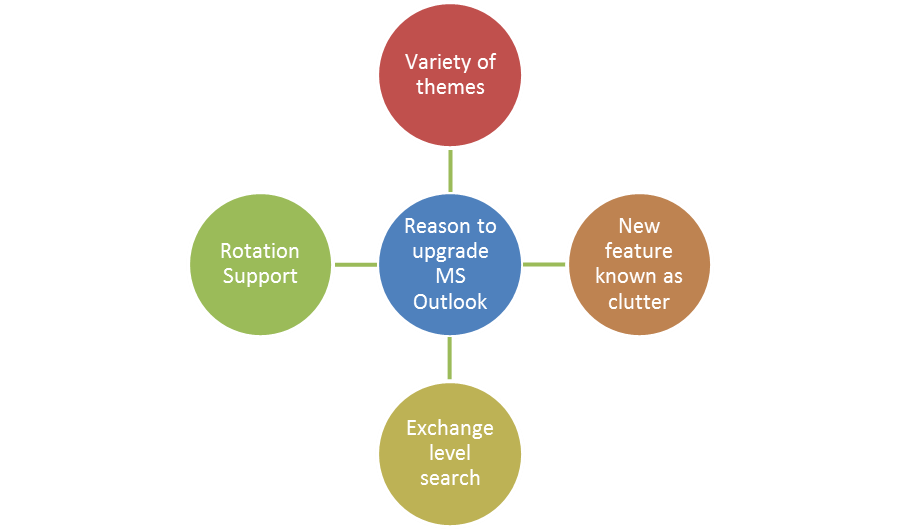
Manage contacts and make notes

Schedule your meetings

Manage different accounts on MS Outlook

Understand about Clutter which will help to manage inbox
As we know in this modern era Email has become one of the most frequently used methods of communication, whether it is used for personal, business or Professionally communications. It doesn’t matter whether you are working in a large or small organisation, email is the most preferred form of communication among the employees.
Nowadays many organisation has decided to implement corporate mail management system for, e.g., Outlook to communicate and organise meetings. It will also help to share your calendar and contacts with others.
Microsoft Outlook training is planned for delegates who have very less knowledge of the Microsoft Outlook 2016 users who want to learn the concepts covered in this course in the 2016 interface. Microsoft has added a new feature in the Outlook known as Clutter it moves emails that users ignored to Clutter to keep the Inbox clean.
Delegates will use Outlook to manage your email communications, including write, manage contact information; read, and respond to emails; schedule appointments and meetings; schedule tasks and create notes; customise message response options, and organise your mail. MS Outlook 2016 also provides different fonts for Arabic as well as Western European languages. This course will provide delegates with the knowledge and skills necessary to be a proficient user.

What is Microsoft Outlook Training?
Microsoft Outlook 2016 provides better organisation, social networking features, search capabilities, and communication. With this Microsoft Outlook 2016 training course, you will learn the four major components of Outlook including contacts, email, calendars and tasks that make things easy for users.
Why Should I take Microsoft Outlook Training?
This Outlook training is suitable for those delegates who want to upgrade their knowledge related to MS Outlook 2016, so they can compose and send, manage personal tasks, scheduling of meetings, and make notes.
Delegates will learn to customise a different set of command, manage different mail accounts, make rules to automate the variety of tasks, set different global options, attach files, check spelling. Apply filters to intercept mail and control spam, manage tasks, handle calendars and contacts, and archive data to protect it.
What are the benefits of Taking Microsoft Outlook Training?
Delegates will learn tasks such as:
Why choose Pentagon Training?
Pentagon Training is known as the best training Provider in all domains.Our instructors are certified and experienced so that delegates will not get difficulty during the course. Pentagon training is one of the most leading training providers of this training due to its high-quality content. It is most trusted by professionals and industry leading brands. Our well trained and experienced instructors teach that what is required by industry.
Enquire Now
----- OR -------
Reach us at +44 1344 961530 or info@pentagonit.co.uk for more information.
Poole
Poole is situated on the south coast of England in the county of Dorset. It is also treated as a seaport and a large coastal town. Poole is 33 km east of Dorchester and also joins Bournemouth in the east. In 1997 local Council Borough of Poole was made a unitary authority. It gained its administrative independence from Dorset County Council. According to 2011 Census, Borough had a population of 147,645. This population made it second largest town in Dorset.
Along with Bournemouth and Christchurch, town forms South East Dorset Conurbation. It had a total population of over 465,000.
Human settlement in Poole started back before the Iron Age. Town’s name was earliest recorded in the 12th century when town emerged as an important port. With the introduction of wool trade, this town prospered. The Later city developed significant trade links with North America. During the 18th century, it was one of the busiest ports in Britain. During Second World War, Poole was main departing ports for Normandy landings.
Poole is also a tourist resort that attracts many visitors. Poole is popular due to its natural harbour, incredible history, Lighthouse arts centre and Blue Flag beaches. Royal National LifeBoat Institution headquarters are also located in Poole. Royal Marines have a base in town’s harbour. Poole is also home to Arts University Bournemouth, an important part of Bournemouth University and Bournemouth Symphony Orchestra.
History
During the 19th century, there was a coastal trade to and from Poole. Trade declined rapidly when the railway was built to Hamworthy side of the bridge. People in business were now able to transport goods to and from Poole with the help of rail. In 1872 another railway was built in the middle of the Poole. During 19th century life in Poole improved. In 1887 first public library was opened. In 1890 Poole Park was opened, and in the same year, Parkstone Park was opened.
In novels of Gullivers Travels, Lilliput was the name of the land. According to some information, there was a house called Lilliput. This house existed at beginning of 19th century, and this gave this area a name Lilliput.
Electric trams started running during 1901 through the streets of the Poole, but then buses replaced them. In 1935 last trams ran in Poole.
In 1910 first cinema in Poole was opened. Municipal offices at Poole were built in the year 1932. The population of Poole was 19,000 in the 20th century, but later it grew at a phenomenal rate. Old industries of brick making, brewing and shipbuilding decline during the 20th century. Pottery industry survived somehow. In 1969 Dolphin Centre was opened. Poole general hospital was opened in 1969. In 1974 Poole Lifeboat Museum was opened. In 1978 Arts Centre was opened. Poole became a unitary authority in the year 1997. In the 21st century, Poole has become a Pottery Centre which made it an attractive tourist destination. Today Poole flourishes on Tourism. In 2007 Poole Museum was reopened. Present Population of Poole is 138,000.
We are offering more than 250 courses at 91 locations in UK.